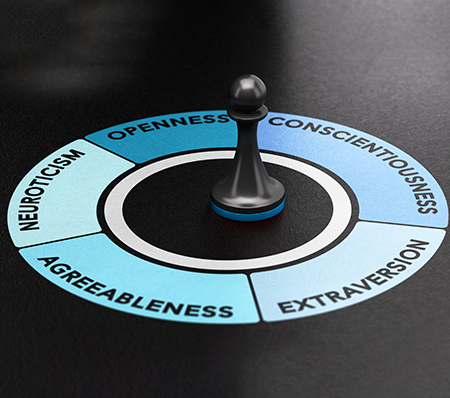 Having the same problem again and again?
Having the same problem again and again?
It might be your personality.
Would you like to be mindful of recurrent patterns of behavior that don’t work for you? A personality assessment is a terrific way to increase self-awareness in personal and professional settings.
At work, this could unlock issues that are hindering your career progression. Your boss keeps passing you over for promotion because you’re not naturally detail-oriented. Understanding this personality difference and awareness allows you to take concrete action. For example, delivering the report a day before the deadline. You wouldn’t usually think about doing this, but this behavior shapes your boss’s opinion of you (especially if she is high in conscientiousness). Your promotion may be riding on making this behavior change!
Another thought to consider is how well your personality matches your chosen profession. For example, if you want to be a firefighter but are sensitive to negative emotions like worry, then being a firefighter would be a poor vocational choice.
Understanding your personality also can be helpful in romantic relationships as it helps you understand your habitual patterns of behavior and how your partner might be inclined differently. This increased self-awareness gives you options about how you want to create a different and more satisfying relationship with your partner.
 A quick overview of personality assessment…
A quick overview of personality assessment…
The field of personality assessment has more or less coalesced around the Five-Factor Model (FFM) of personality.
This model breaks down your personality into five domains: sensitivity to negative emotions, extraversion, openness to experience, agreeableness, and conscientiousness. Your personality is a composite of low, high, or moderate values in each area.
The FFM has been extensively researched, reviewed, and tested. It suggests that your personality remains stable over your lifetime (barring an extraordinary event like a traumatic brain injury or near-death experience). The NEO-PI, which I use, is the gold standard of the Five-Factor Model or the Big Five personality assessment.
Here’s a quick example…
Great inventors and scientific luminaries have two factors in common in their personality profiles.
The first is that they are HIGH in “openness to experience.” This makes sense because they are actively exploring the world of science (or their technology), and their curiosity pushes them to look further than others.
They also happen to be LOW in agreeableness. This personality trait means they don’t really trust what the establishment tells them and look doubtfully and critically at “what everybody knows.”
Now, you don’t HAVE to have this personality profile to make a great scientific discovery, but working at your craft with great curiosity and being less trusting and more critical of current understandings would serve you well in your endeavors.
One thing to remember is that there is no “good” or “bad” personality. You might be inclined toward worry or anxiety if you’re highly sensitive to negative emotions. But that personality might shine if your company is looking for someone to find potential problems for a proposed action plan! Given this personality bent, you would be well-positioned to notice all the things that might go wrong, which would be very helpful in that context.
 Let’s talk about how a personality assessment can help YOU…
Let’s talk about how a personality assessment can help YOU…
I like to think of personality as your operating system, so it runs all the time (in the foreground or background), even in the most mundane situations. Your personality shines through when you cook dinner at home, work in the office, hang out with your family, and make new friends.
Personality assessments raise your awareness, give insights into behavior patterns, and offer a language to understand yourself better.
A personality assessment makes you AWARE of your tendencies and helps you think and talk about them.
Why does this matter in your life?
When you understand how you operate, you can live your life with more intention. Instead of living on auto-pilot, you can craft your life to align with who you are and what you value.
It helps you with your blind spots. For example, if you know you’re prone to worry, you might take intentional action and learn to be more flexible in your thinking. Or when you know you’re low in conscientiousness (not very detail-oriented), you better understand why, for example, your colleagues might not rely on you that often.
As mentioned, being aware of your personality lets you be more intentional with your decisions, opting for a life that reflects your values. I have a colleague who is low in agreeableness. His first reaction to new research is to look for its shortcomings, and he’s generally critical and mistrusting when meeting new people. But he values service and support to others, so he can consciously direct his reactions and behaviors in that direction, keeping his values in the driver’s seat and mindfully managing his personality.
A personality assessment will enhance your therapy!
Personality assessment is but one part of the comprehensive and multimodal approach used at the Center for Intention & Focus. Please note that it’s used exclusively as a part of the therapeutic relationship and is not issued as a stand-alone service.
The personality assessment can bring your tendencies, brain, and goals into a greater focus.
Let’s put it to work, creating the life you’ve always imagined. Call today: (832) 831-0178.

